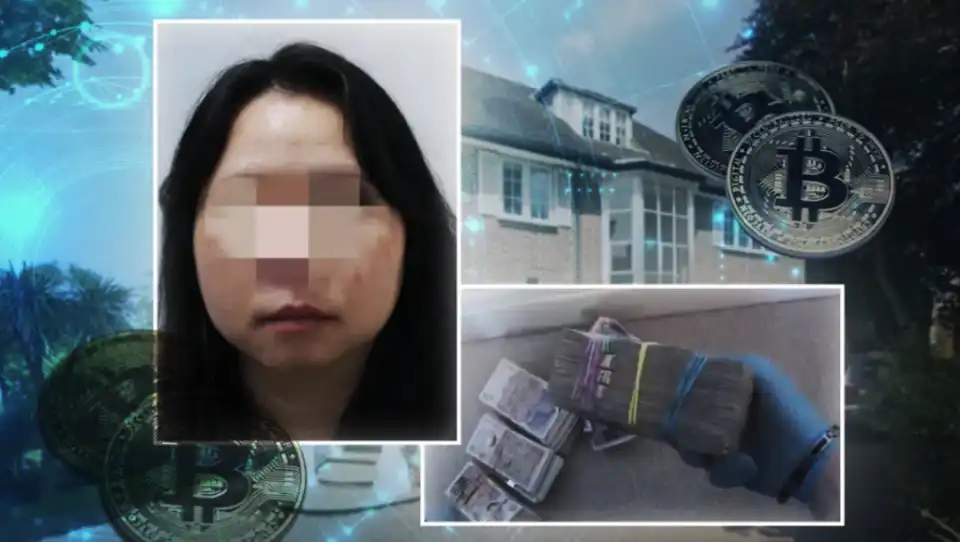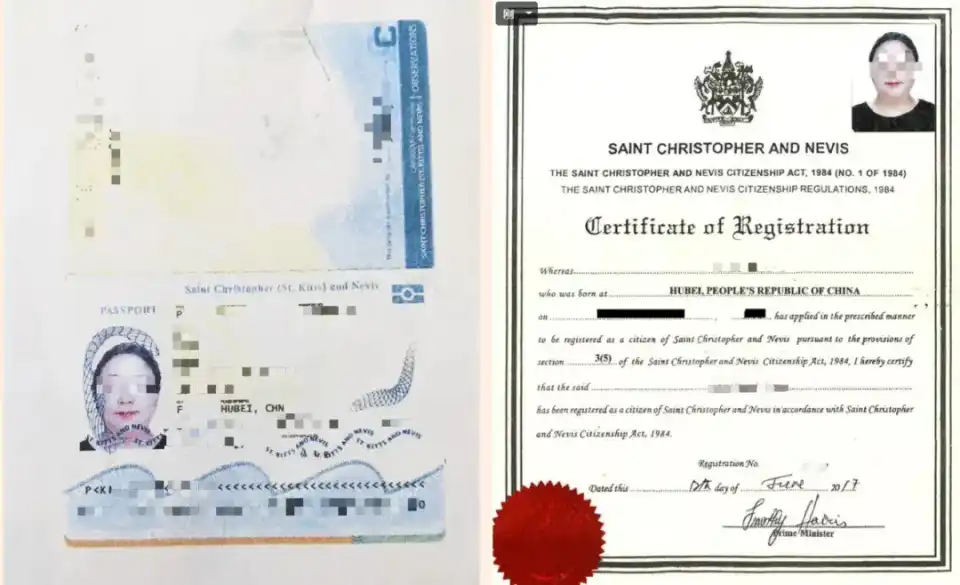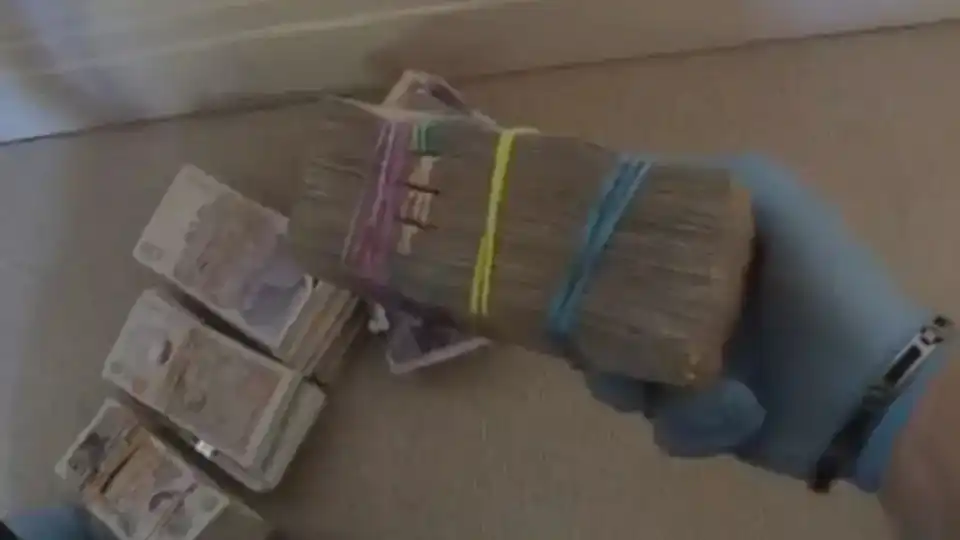Source: Phoenix News "Eye of the Storm" Compilation
When Jian Wen wrote the sentence "The person who said 'you are very poor': Look at how I have grown into a millionaire!!!" on the letter paper, she may not have anticipated that her story would cause a sensation.
On March 18th, a British court found 42-year-old British Chinese woman Jian Wen guilty of money laundering and she will be sentenced on May 10th. During the investigation, the police seized over 61,000 bitcoins, worth about 3.4 billion pounds, the largest amount of cryptocurrency ever seized. These funds were alleged to have come from a fraud group that deceived nearly 130,000 Chinese investors between 2014 and 2017.
Regarding the 61,000 bitcoins seized, the Financial Times revealed that the UK's Crown Prosecution Service has initiated civil recovery proceedings in the High Court. If no one else has the right to these assets, half of the confiscated funds will go to the UK police and the other half to the UK Home Office.
"This is a long-planned fraud case, and the fraudulent means involve illegal absorption of public deposits. Criminals also used virtual currency for money laundering, with a seamless connection from start to finish," commented Yan Lixin, a professor at the International Finance School of Fudan University and executive director of the China Anti-Money Laundering Research Center, to Phoenix News "Eye of the Storm". "The actual difficulty in executing this case, especially in terms of the ownership and disposal of bitcoins, lies in international coordination and cooperation in anti-money laundering."
Chinese takeaway delivery worker "suddenly rich overnight"?
It is reported that Jian Wen used to be an ordinary employee in a restaurant in the UK and lived a simple life. However, it was shocking that she suddenly possessed a huge fortune in bitcoins. People couldn't help but wonder how Jian Wen achieved this astonishing transformation.

(Image source: news.sky)
According to reports, Jian Wen admitted that she grew up in an ordinary working-class family in China and met her ex-husband Marcus Barraclough there. In 2007, she and her husband came to the UK while she was pregnant.
Unfortunately, their marriage came to an end after their son was born. After the divorce, Jian Wen lived a frugal life in Leeds, during which she pursued and obtained a law degree and a bachelor's degree in economics. In the summer of 2017, she moved to London. To make a living and support her son, Jian Wen worked hard at a Chinese takeaway shop in Abbey Wood in southeast London, and even lived in a small room downstairs in the restaurant. To increase her income, she also took on multiple jobs, including handling cryptocurrency.
Jian Wen recalled that one day she saw an advertisement for a "housekeeper" on WeChat, out of curiosity and necessity, she decided to contact the employer to give it a try. Later, she met her future employer, Qian Zhimin (who was using the pseudonym Zhang Yadi) for the first time at the five-star Royal Garden Hotel in Kensington. This meeting became a major turning point in Jian Wen's life.
Mastermind absconds with $6.3 billion from the UK
The background of Qian Zhimin, the employer Jian Wen met, is complex.
In 2014, Qian Zhimin carefully planned a "wealth management plan" in China, successfully swindling a huge amount of funds from 130,000 unsuspecting investors. In just three years, she absorbed nearly $6.3 billion in funds and then quickly absconded with the money.
Police records show that Qian Zhimin was born in 1978 and had operated a company called Tianjin Blue Sky Gray Electronic Technology Co., Ltd. (established in March 2014). Her life experience before this was largely unknown.
According to court documents in the UK, Blue Sky Gray had sold investment products and promised investors a return rate of up to 300%. The company also claimed to have a sideline in bitcoin mining.
However, UK court documents revealed that the company "used almost obsolete (mining) equipment as a cover to deceive potential investors."
Ultimately, Qian Zhimin was suspected of transferring investors' funds to an account at a cryptocurrency exchange and then absconding with the money after converting it into bitcoins.
This absconding was not without warning. Shortly after the establishment of Blue Sky Gray, Qian Zhimin successfully persuaded employee Ren Jiangtao to become the company's sole shareholder and legal representative, using high salaries and generous bonuses as bait.
It is reported that in addition to paying Ren Jiangtao a monthly salary of up to 26,948 RMB, she also paid him a one-time bonus of 997,000 RMB. She also opened a bitcoin account in Ren Jiangtao's name, but according to Ren Jiangtao, all the funds in that account were controlled by Qian Zhimin.
Ren Jiangtao stated that Qian Zhimin had assured him that if the company encountered any trouble, she would help him get out of any legal difficulties.
However, after a Chinese department launched an investigation in July 2017, Qian Zhimin quickly fled the country.
At that time, Qian Zhimin carried a black Lenovo laptop with an encrypted wallet containing bitcoins worth billions of pounds, transferred from Ren Jiangtao's account.
Subsequently, she entered the UK under the alias Zhang Yadi, carrying a fake passport.

According to prosecutor Gillian Jones KC, after arriving in London, Qian Zhimin needed to exchange the bitcoins in her possession for cash or other valuable items such as jewelry.
Furthermore, she had encountered a car accident, which made it difficult for her to breathe and walk. What's worse, she could hardly speak English. Therefore, she urgently needed someone to take care of and assist her, preferably a Chinese person.
It was out of this need that she began looking for a reliable intermediary. This is how her fate intersected with Jian Wen's.
Lavish spending triggers investigation
After becoming Qian Zhimin's assistant, Jian Wen's life underwent a dramatic change. She moved from a dark basement to a mansion worth 5 million pounds in North London.
The UK's Crown Prosecution Service detailed Jian Wen's extravagant spending list. In 2017, Jian Wen rented a spacious six-bedroom property in London, paying a monthly rent of up to 17,000 pounds and paying six months' rent in advance. In addition, she arranged for her child to attend a prestigious school near the mansion, with a tuition fee of up to 6,000 pounds per term.

(Image source: cps)
Not only that, Jian Wen also purchased a Mercedes E-Class for herself and became an esteemed customer at the top luxury department store Harrods. Court documents show that her average monthly spending at Harrods reached 30,000 pounds.
With her social status elevated in British society, Jian Wen transformed from a restaurant employee to a jewelry trader, embarking on her global luxury journey. In Dubai, she spent 500,000 pounds on an apartment; in Italy, she bid for a Venetian sea-view antique mansion worth 10 million pounds; in Switzerland, she splurged 70,000 pounds at Van Cleef & Arpels and spent 75,000 pounds on diamonds at a private jeweler. From the fall of 2017 to the end of 2018, Jian Wen also purchased three properties in London, valued at 4.5 million pounds, 23.5 million pounds, and 12.5 million pounds, respectively. However, due to the strict anti-money laundering regulations in the UK, she had to provide proof of the legal source of the funds.

It was because Jian Wen failed to timely exchange enough bitcoins for pounds that she attracted the attention of regulatory authorities.
At this point, the police targeted Jian Wen and officially launched an investigation into her.

Sudden Arrest
In the early hours of October 31, 2018, the police raided a red-brick mansion in Hampstead, North London, and thoroughly searched Jian Wen's residence.
Over the next few hours, the police seized a laptop, tablet, and a pink USB drive stored in a metal can. Additionally, in Jian Wen's bedroom, the police found up to £69,000 in cash. A large amount of cash was found in Wen's home during the raid.

(Image source: news.sky)
When the police noticed Jian Wen attempting to delete applications from her iPhone, they demanded that she hand over her phone immediately. Inside the phone case of another iPhone, the police also found two €500 banknotes and a handwritten note with a list of passwords.
The next day, the police conducted another search of the residence and found a safe. Inside the safe, they discovered over 61,000 bitcoins - one of the largest bitcoin seizures in the history of UK law enforcement.
By the time the safe was fully unlocked in 2021, the value of these seized virtual currencies had reached £1.4 billion. At the current price of $71,000 per bitcoin, the total value of these bitcoins had soared to $43.31 billion.
After a lengthy investigation and tracking, Jian Wen was finally arrested and brought to justice in May 2021, with the trial process lasting over a year.
In 2023, Jian Wen faced 12 charges in her first trial. Ultimately, 2 charges could not be determined, and 10 charges were acquitted.
Last week, Jian Wen appeared in court for a second trial. In addition to the 2 charges that had not been determined previously, a new charge was added due to newly discovered wallet evidence. In this trial, the jury ruled by a majority that she was guilty of one of the three money laundering charges. The jury was unable to make a ruling on the other two issues.
With this, Jian Wen's criminal activities finally came to an end. Due to the massive scale of the case, Jian Wen was classified as a Class A criminal, the most dangerous type that poses the most serious threat to society, police, or national security if they escape. What awaits her will be a long life behind bars.
Where is the Mastermind Hiding?
The mastermind behind the case, Qian Zhimin, disappeared and remains untraceable after learning that her residence was being searched.
During the trial process in the UK, Jian Wen admitted that she did indeed participate in handling cryptocurrency, but she firmly denied knowing that these funds were proceeds of crime and insisted that she was deceived by "that woman".
In Jian Wen's description, Qian Zhimin's life seemed extremely bleak. Due to a previous car accident, Qian Zhimin's mobility became extremely limited, spending most of her time bedridden, relying on a laptop for gaming, shopping, and bitcoin trading to pass the time.
"She often has nightmares, waking up screaming in the middle of the night, and spends the whole day in bed. Who would have thought that she had been using a false identity all this time?" Jian Wen lamented.
Reflecting on this experience, Jian Wen deeply felt that she had been severely exploited. "Even now, I still don't know where Qian Zhimin is," she said helplessly.
The police stated that they are still actively tracking Qian Zhimin's whereabouts. Jian Wen will face the final judgment in May.
According to the Financial Times, the UK's Crown Prosecution Service has initiated civil recovery proceedings in the High Court regarding the handling of the 61,000 bitcoins, to determine if there are other legitimate claimants. Once these assets are formally confiscated, as per regulations, half will go to the UK police and the other half will be allocated to the UK Home Office.
"If, and only if, no one or other legitimate entities come forward to claim and recover this right, the UK Home Office and the police will naturally 'share the spoils' after the necessary legal procedures. I think they have enough motivation to do so," said Yan Lixin, a professor of finance at Fudan University's International Finance School and executive director of the China Anti-Money Laundering Research Center.
So, can the 130,000 Chinese victims receive compensation? Yan Lixin told Phoenix News "Eye of the Storm" that the Chinese government, judicial authorities, and police will not sit idly by and have the right to pursue and recover this case. The UK should cooperate and support this, as both are members of the Financial Action Task Force (FATF) and must adhere to common rules.
Yan Lixin pointed out that the division of stolen funds is an internationally accepted practice. In this case, the UK has invested corresponding judicial and law enforcement resources to crack the case, and it is understandable and acceptable to obtain the necessary compensation. However, it also needs to be controlled within a reasonable range. Therefore, this case requires diplomatic coordination between China and the UK, as well as judicial and law enforcement cooperation to achieve a win-win situation within the international legal framework, in order to minimize the losses for the 130,000 victims in China.
Regarding the difficulties of the case, Yan Lixin stated that the seizure, freezing, confiscation, and disposal of virtual currencies face many "difficulties and even impossibilities", which is a global problem. Why is it so difficult? First, it is difficult to determine ownership. Virtual asset accounts are not real-name registered, have anonymity, decentralization, and intangibility, making ownership difficult to determine, which poses obstacles to enforcement actions such as seizure and freezing. Second, there is a lack of valuation standards. Virtual assets do not have a unified pricing mechanism, with high price fluctuations, making evaluation and disposal difficult. Third, there is a lag in technical means. Law enforcement agencies have insufficient understanding of the operation mechanism of virtual assets and lack effective technical means for evidence collection, tracking, and control. Fourth, there is difficulty in international coordination. The cross-border movement of virtual currencies requires close cooperation between regulatory authorities of various countries, but due to inconsistent interests, regulatory standards, and even relevant laws and regulations, international coordination is extremely difficult.
"The case involves a large number of victims, poses a great danger, and has a serious impact, so it is necessary and urgent for all parties to improve the relevant laws and regulations on the 'seizure, freezing, confiscation, and disposal' of virtual currencies, form regulatory and law enforcement consensus, strengthen international cooperation, and take convergent measures to combat money laundering and other crimes using virtual assets," said Yan Lixin.
References:
- How Chinese takeaway worker led police to Bitcoin worth £3bn in Britain's biggest ever cryptocurrency seizure. Skynews
- A $5.6 Billion Bitcoin Fraud Case Snares UK Fast Food Worker. Bloomberg
免责声明:本文章仅代表作者个人观点,不代表本平台的立场和观点。本文章仅供信息分享,不构成对任何人的任何投资建议。用户与作者之间的任何争议,与本平台无关。如网页中刊载的文章或图片涉及侵权,请提供相关的权利证明和身份证明发送邮件到support@aicoin.com,本平台相关工作人员将会进行核查。




